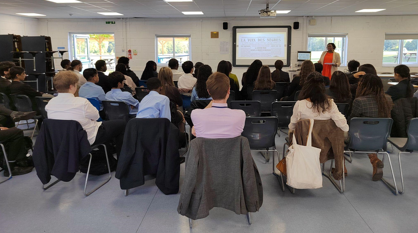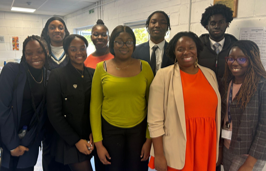

‘Black (Her)stories’ Lecture'
Students were invited to attend a lecture led by Dr Kesewa John, a historian of liberation movements, intellectual history, and gender. Those attending included members of ACS, English prefects, teachers, those interested in history and literature, as well as those specifically interested in Black history and Literature. Linking with this year’s theme for Black History Month, ‘Celebrating our Sisters’, Dr John gave us detailed insight into the work of selected black writers, the way they share and highlight black histories within fiction and the manner in which black histories (and history in general) has excluded and marginalised black women.

As Dr John concluded her introduction on the under-recognized and under-celebrated figures of 1930s black history, she shifted the focus to the phenomenon which leads to the obscure status of these individuals within history, with reference to a book: “Silencing The Past” by Michel-Rolph Trouillot. Dr John spoke of how, at the time of their conception, some of these historical events would have been so utterly inconceivable to contemporary historians, that they would have been ignored and excluded from their writings. A typical example of this is the failed invasion of Ethiopia by the Italian forces of Mussolini in 1896. The idea that an African nation was capable of resisting European dominance militarily, would have been so unthinkable that the eurocentric climate of opinion would have rejected and denied it, leading to a distinct lack of primary sources about the event. Dr John highlighted the importance of historical fiction in filling in these gaps, and shedding light on the nature of these ‘unthinkable histories’. Another recommendation includes: “Half Blood Blues” by Esi Edugyan, a novel about the world of jazz musicians from the Berlin scene and how their lives were impacted by World War II. She recommended a range of texts which are included at the end of this article.
During the Q+A section of the talk, Dr John spoke about how, despite efforts like her lectures, and eye-opening literature about the subject, she believes that these key figures, to this day, are still massively over-shadowed. This provides more of a reason to spread awareness about these important black women in history and promote and read literature to shine a light on this neglected part of history.

For members of the Afro-Caribbean Society (ACS), the talk was a significant opportunity to become further educated on Caribbean history and the significant role it has played in the past. Moving forwards, as a collective, in ACS we will ensure that we generate an environment where our history can be learnt and hope to create multiple occasions to salute black success.
Overall, the talk was quite informative, interactive and quite compelling. We learnt about many areas of history that many listening were oblivious to. The content of the lecture was actually rather shocking and definitely should be included somewhere within the school curriculum. Also, the books we spoke about in the Q+A seemed really interesting and I would recommend that everyone should give them a try.

A big thanks to Ms Watkins for arranging this event; Ms Adeaga for the contact and most importantly, Dr Kesewa John for taking time out of her busy schedule to speak with us and share resources.
Lano Adebayo, Lanre Edidi, Albert Cripps &
Callum Matthews, Year 12

Dr Kesewa John’s Recommended Caribbean Historical Fiction from her lecture.
For the full list, please click here. For an up-to-date database of Caribbean literature curated by Dr. Schuyler Esprit at the University of the West Indies, please click here.